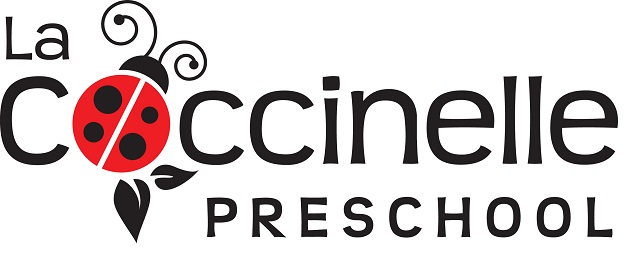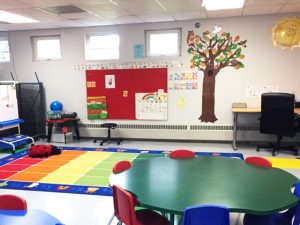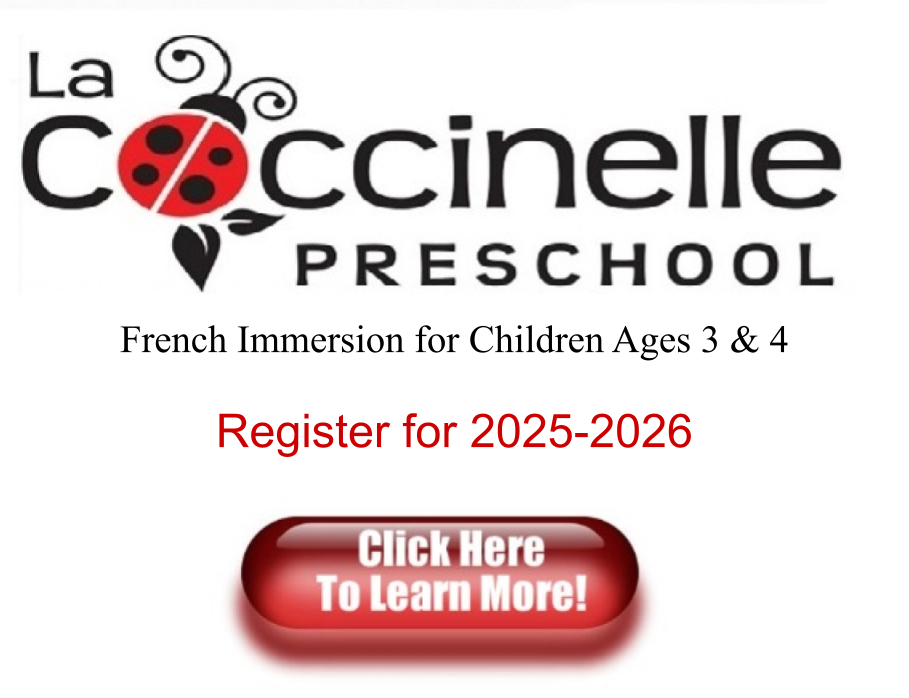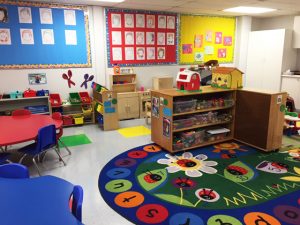 La Coccinelle is a structured program based on teaching, nurturing and balancing the “whole” child. We value and foster cognitive, emotional, and social as well as fine and gross motor development. We believe that choice and free play is also very important. Children have a natural impulse to explore and create. At La Coccinelle we want to empower the children and offer positive learning development through a variety of different “guided” play opportunities. La Coccinelle’s main goal is to assist the child through his/her development as a “whole child.” La Coccinelle will provide opportunities to the children where they can…
La Coccinelle is a structured program based on teaching, nurturing and balancing the “whole” child. We value and foster cognitive, emotional, and social as well as fine and gross motor development. We believe that choice and free play is also very important. Children have a natural impulse to explore and create. At La Coccinelle we want to empower the children and offer positive learning development through a variety of different “guided” play opportunities. La Coccinelle’s main goal is to assist the child through his/her development as a “whole child.” La Coccinelle will provide opportunities to the children where they can…
- develop intellectually: with opportunities to think, to resolve problems, to communicate, to discover concepts
- develop socially: with opportunities to cooperate, to negotiate, to initiate interactions with peers, to participate in groups
- develop physically: with opportunities to cut, draw, lace, dress-up, to pour, sift and shake, and to dance, move and stretch
- develop emotionally: with opportunities for self-expression, to choose to take risks and to be successful
- develop creatively: with opportunities to try (take risks) to make choices, to resolve problems, to accomplish and to create.
Guidelines
We strive to help children develop using the following guidelines:
- The French component of La Coccinelle playschool is to immerse the child into the language by gradual introduction through the use of songs, simple instructions and basic vocabulary (colours, numbers, shapes), using a theme-based curriculum. For example, September’s theme may be “school and community safety” with a visit to the fire hall, learning the colors on the traffic lights, playing ‘red light, green light’ (in French!), and activities that will help children choose healthy snacks and identify community members who help keep us safe and healthy. No expectations are placed on a child, as each child’s ability to comprehend and develop is individual.
-
The ‘circle time’ is the stage for introducing new vocabulary and concepts. Each day the children participate in a collective class activity, where each child is involved in a creative form of learning as well as social interaction with peers. It is a guided learning time, where we encourage each child to use his/her imagination.
-
Most children thrive on a consistent routine. We follow a daily schedule from the child’s arrival at the school until the time he/she is picked up. The children quickly pick up and enjoy this routine, often keeping the teachers on track! This eases the separation from parents and caregivers, and also helps to prepare the child for the formal school setting.
-
Another important component of La Coccinelle’s program is based on the concept of “free play.” There are several opportunities each day for children to make their own choices of activities. However, all learning experiences are carefully planned. Each play centre – sand table, water table, puzzles, book area, etc. – contributes to the “whole child” development; that is to say physical, intellectual, social, creative and emotional development. The centres are planned so children can be involved in “all” different kinds of play: functional play (i.e. running, pouring, dumping and repetition of movement), constructive play (i.e. art, blocks, building and creating) and dramatic play (i.e. the house corner and role-playing). La Coccinelle believes that when children make their own choices of activities and are in control of their play that this play becomes meaningful and experiences become learning ones.
Play
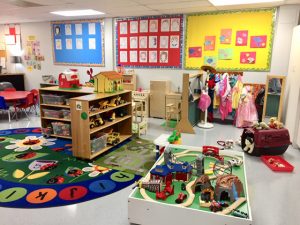 The next section will define briefly what is “play” and why playtime is so important for children. Elizabeth A. Munroe, in the book Let Me Play, (strongly recommended to parents to read) summarizes very clearly what is play. Ms. Munroe poses three questions we can ask ourselves to determine if a child is playing or not: 1. Did the child choose to do this? 2. Is the child free to decide how to use the equipment or toys (within reason)? 3. Is the child free to stop the activity? If all the answers are YES, then the child is playing and involved in a meaningful learning situation. Through play, children have opportunities to look, touch, listen, taste, smell and move. Children then discover more about themselves and learn about their world. They re-create what they have been observing, imitating adult roles, discovering how things work, learning how to manage feelings, how to engage in relationships and learning concepts. It then becomes more important to let the children lead their own play when we understand that children, just like adults, learn by doing.
The next section will define briefly what is “play” and why playtime is so important for children. Elizabeth A. Munroe, in the book Let Me Play, (strongly recommended to parents to read) summarizes very clearly what is play. Ms. Munroe poses three questions we can ask ourselves to determine if a child is playing or not: 1. Did the child choose to do this? 2. Is the child free to decide how to use the equipment or toys (within reason)? 3. Is the child free to stop the activity? If all the answers are YES, then the child is playing and involved in a meaningful learning situation. Through play, children have opportunities to look, touch, listen, taste, smell and move. Children then discover more about themselves and learn about their world. They re-create what they have been observing, imitating adult roles, discovering how things work, learning how to manage feelings, how to engage in relationships and learning concepts. It then becomes more important to let the children lead their own play when we understand that children, just like adults, learn by doing.
Let’s look at Mark, who had been trying for a little while to build a tower with blocks. The building kept falling down because Mark did not understand the concepts of gravity and balance. But Mark kept trying, trying and trying again until one day the building was tall and strong. Mark then found a real pleasure in knocking down the building and in building it again. Through the process, Mark learned many different concepts and developed a sense of initiative and industry. If Stefan joined Mark in building, many other skills would be developed (cooperation, negotiation, communication and language). Through their experience, the boys made many discoveries. If however, an adult had interacted right away (i.e. told Mark how to place the blocks so the tower stayed up) most of the discoveries would not have taken place. The adult involvement becomes important when the child is becoming frustrated by the situation or is ready to give up. The adult encourages the child by giving suggestions: “I wonder what would happen if…?”
The quality of the child’s play is definitely affected by the environment. When planning the play centres, time, space and materials are important factors to consider: Time: Children need enough time to plan and carry out the constructive and dramatic play. A long play period allows the child to persist and to get involved in different centres. On the contrary, too short a play period discourages the child from engaging in more complex play. Space: Children need space where they can be involved with other children as well as space where they can have more private time. They also need a specific area that belongs to them (like lockers). The play centres need to be easily defined and located according to noise level (quietest – quieter – quiet – noisy – noisier – noisiest). Materials: Children need stimulating and developmentally appropriate materials. Too easy is not challenging enough while too hard is too much of a challenge. The materials are chosen according to the children’s needs. The materials also need to be regularly rotated to maintain interest. Children also need to have lots of choice.
Parent Involvement
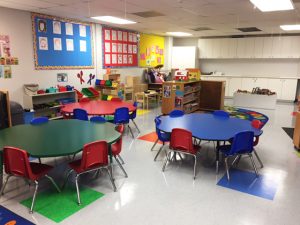 For each child enrolled, a parent or significant adult is required to spend time in the classroom as a teacher’s aide. The adult does have a very important role in the quality of the children’s play. The adult (teacher, parents) becomes a provider and facilitator. The adult provides opportunities for the children to make decisions, to explore, to express themselves, to initiate relationships. The adult also assists children in expressing their feelings (anger, sadness, frustration) in a positive way; helps children to develop their socio-dramatic play in a more complex way. And, of course, adults provide the very important “role models” for the children. Parents are also required to volunteer on the Board of Directors or as members of a committee.
For each child enrolled, a parent or significant adult is required to spend time in the classroom as a teacher’s aide. The adult does have a very important role in the quality of the children’s play. The adult (teacher, parents) becomes a provider and facilitator. The adult provides opportunities for the children to make decisions, to explore, to express themselves, to initiate relationships. The adult also assists children in expressing their feelings (anger, sadness, frustration) in a positive way; helps children to develop their socio-dramatic play in a more complex way. And, of course, adults provide the very important “role models” for the children. Parents are also required to volunteer on the Board of Directors or as members of a committee.
The role of the parent helper is very important. To follow La Coccinelle’s philosophy, they can assist the children by getting involved in their play, remembering that the child needs to be in control. Make suggestions (ask questions) instead of directions (“I wonder what would happen if…?”). Once again, follow the child’s lead. Let the child decide what to do…remembering that there is no wrong way. Praise the process instead of the product (avoid giving models) (“I really like how you made that!”, “What a good idea…how did you make it?”). Encourage the children to try to take risks, recognize and accept their feelings, help the child express them. Assist the children to develop language skills (French vocabulary) through their play (i.e. “Would you please pass the block that is jaune?”).
